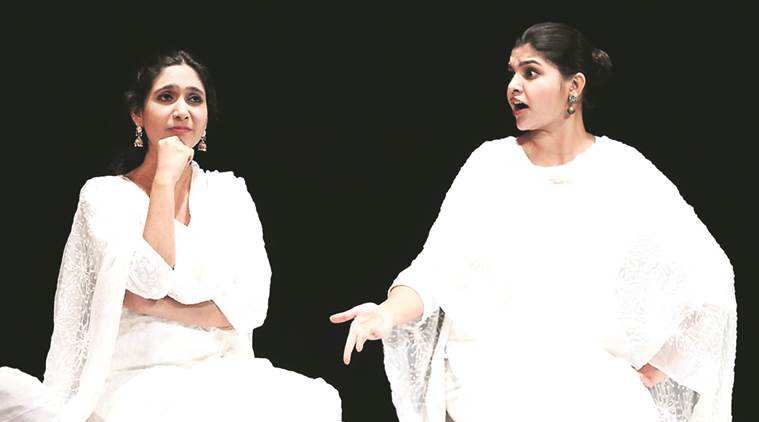A new dastangoi production recounts the horrors of the Jallianwala Bagh massacre
An MPhil in history from University of Delhi, Farooqui’s research focuses on the school history textbooks produced after Independence, where she attempted to study textbooks as devices of publicity, performative nationalism, and pedagogy.
 Dastangos Ainee Farooqui (left) and Nusrat Ansari
Dastangos Ainee Farooqui (left) and Nusrat Ansari
Kis zaban se kah rahe ho aaj tum saudagaro, dahr mein insaniyat ke naamko uncha karo, jis ko sab kahte hain hitler bhediya hai bhediya,bhediye ko maar do goli pae-amn-o-baqa… Dastango Ainee Farooqui recites Urdu poet Josh Malihabadi’s East India Company ke Farzandon Se — his powerful response to the Jallianwala Bagh massacre — to begin her dastan. She moves beyond historical facts and turns towards other giants in Urdu literature — Saadat Hasan Manto, Krishan Chander, Allama Iqbal — to weave the haunting story in the history of Indian freedom struggle. Farooqui, along with Nusrat Ansari, will stage Dastan-e-Jallian in Delhi.
“We have all heard of the massacre, we know of the barbarity. But we recognise this as the handiwork of just one person — General Dyer — but it wasn’t just him. It was the social structure of the time and racial discrimination that led to it. It was not an aberration in history, the whole system was Jallianwala Bagh — the repression, suppression, discrimination in the everyday,” says Ainee, who wrote it to mark the event’s centenary year.
An MPhil in history from University of Delhi, Farooqui’s research focuses on the school history textbooks produced after Independence, where she attempted to study textbooks as devices of publicity, performative nationalism, and pedagogy. She started engaging with the art form of dastangoi, and learned the ropes from Mahmood Farooqui, as she felt it was a medium through which history can break out of the classrooms to reach a wider audience. She and Ansari conduct workshops in schools across Delhi.
For this dastan, Ainee also turned to the Hunter Commission Report, which examined the event, and also the Minority Commission Report, which was submitted by the Indian members of the Hunter Commission. “You also find snippets from the pamphlets and poetry written by witnesses and victims in the dastan, which we sourced with the help of historian Shahid Amin,” she adds. There are also verses from Rabindranath Tagore’s speech after he returned his knighthood.
The performance will be staged on November 14, 6.30 pm, at India International Centre, Delhi. Tickets on bookmyshow




- 01
- 02
- 03
- 04
- 05























